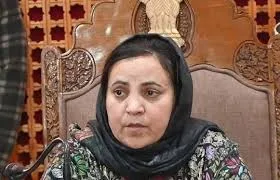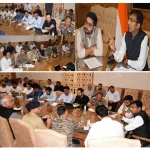Srinagar, Aug 25: Minister for Social Welfare, Health and Education Sakeena Itoo on Monday said the Omar Abdullah government brought “historic reforms” in Jammu & Kashmir’s welfare sector, but insisted that the biggest challenge remained taking these schemes to people in remote areas.Addressing a Social Welfare Department function here, Itoo said her department was “the department of ordinary people” and must ensure benefits reach those who need them most.“We have no shortage of schemes. What we lack is awareness. Camps should not stop at district headquarters but must reach the remotest villages so that people know how to apply and benefit,” she said.The minister said several flagship programmes were first rolled out when Omar Abdullah was Chief Minister before 2014. She added that old-age and widow pensions were enhanced during his tenure, and have been further raised after his return as CM.The Marriage Assistance Scheme, she said, was also launched under Abdullah, with Rs 50,000 assistance for deserving women, later increased to Rs 75,000. “Thousands of sisters benefitted then, and they continue to benefit now,” she said.Structural reforms were also introduced, including bifurcation of the Social Welfare Directorate into separate units for Jammu and Kashmir divisions, Itoo said, adding that the ICDS sector, employing nearly 28,000 women as Anganwadi workers and helpers, was also given its own directorate.On child welfare, the minister said there is a need for strict monitoring of nutrition supplies in Anganwadi centres. She warned that large funds were being spent, but leakages had to be plugged.“So much money is spent on nutrition, but there must be complete transparency. Teams have been formed to check that the right nutrition reaches every child. No child in Jammu and Kashmir should suffer from malnutrition,” she said.The minister praised the role of the Women’s Development Corporation in offering low-interest loans to women, repayable in quarterly instalments of Rs 12,000–13,000. She said many women had successfully started businesses and become self-reliant.Sakeena also cited the SC/ST Corporation, which provides loans and scholarships, including pre- and post-matric assistance to children from marginalised backgrounds. “Our sisters have immense talent. These schemes are not charity but are a way to help women stand on their own feet and educate their children,” she said.On education, the minister said scholarship schemes were critical to ensure no child dropped out of school for financial reasons. She called the Ladli Beti scheme an important initiative to encourage girls’ education. Currently covering eight districts, she said she has directed the department to expand its reach further.Itoo listed other initiatives being implemented by her department, including homes for the blind and disabled, One-Stop Centres to support women facing domestic violence or harassment, and Stamp duty exemptions on property transfers within blood relations, which she called “a major relief for families.”She said awareness camps were being held across districts where wheelchairs, hearing aids and security certificates were being distributed, but urged officers to extend outreach beyond towns.“Social Welfare is the department that directly touches the lives of ordinary and displaced people. We must carry these services into the remotest villages,” she added.
Search
Archives
- August 2025
- July 2025
- June 2025
- May 2025
- April 2025
- March 2025
- February 2025
- January 2025
- December 2024
- November 2024
- October 2024
- September 2024
- August 2024
- July 2024
- June 2024
- May 2024
- April 2024
- March 2024
- February 2024
- January 2024
- December 2023
- November 2023
- October 2023
- September 2023
- August 2023
- July 2023
- June 2023
- May 2023
- April 2023
- March 2023
- February 2023
- January 2023
- December 2022
- November 2022
- October 2022
- September 2022
- August 2022
- July 2022
- June 2022
- May 2022
© 2022 Foxiz News Network. Ruby Design Company. All Rights Reserved.






